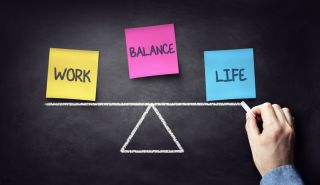Burnout
Avoiding ADHD Burnout at Work and Home
Learn how to reduce stress, boost positivity, and increase self-care.
Updated April 27, 2024 Reviewed by Ray Parker
Key points
- Stress and burnout frequently occur with ADHD due to executive functioning challenges.
- Stress occurs when there are too many pressures on your mind and body, and you feel overwhelmed.
- Burnout reflects a deficiency where you lack energy or resources because you feel depleted.
- Reduce burnout by limiting the overwhelm of ADHD and setting simple tasks for active self-care.

Are you feeling unexcited about work these days? Do you feel overwhelmed by responsibilities at home? You may be stressed, or you could be suffering from burnout. How can you tell these apart? Many neurodivergent folks struggle with managing stress until they are so tapped out that burnout has set it. It can be tougher for adults with attention deficit hyperactivity disorder (ADHD) to recall and apply tools that they know will create more stability and calm in their lives due to challenges with emotional regulation and working memory. Understanding how stress and burnout are related and how they differ can assist you in keeping yourself energized and centered for work, home, and relationships.
Stress continues to be unusually high for many people right now due to all kinds of socioeconomic, familial, and political issues. Stress and burnout are two ends of the energy spectrum. Stress occurs when there are so many pressures on your mind and body: it’s a matter of too much. When people are stressed, they wonder about finding some trick to figure out how to get their lives under control. They experience physical symptoms and feel weighed down by the demands of daily life. Sometimes, they search for a magic solution to make it all go away. Whether you are dealing with persistent work changes, constant demands at home, or all-consuming projects in either place, stress means that you’re juggling various issues and attempting to solve them simultaneously. Life feels overwhelming, with no end in sight.
Persistent stress can lead to burnout over time. You are giving too much until there’s nothing left to give. Burnout reflects a deficiency: it’s a matter of not enough. You lack energy or resources because you are depleted. Your fuel tank is empty. When people are burned out, they experience more emotional symptoms such as hopelessness, sadness, impatience, and procrastination. There's a deep level of exhaustion that no amount of sleep can address. You’ve been multitasking and overworking for too long, wearing out your brain and your body. The candle that you’ve been burning at both ends has no wax left.

Both stress and burnout indicate that a person's work/life balance is out of whack. While lowering stress can prevent and minimize burnout, the two conditions require different but related interventions. The key to lowering stress lies in reducing your commitments and slowing down stimulation. For folks with ADHD, these options can be unappealing and boring. Who wants to limit fun activities or do only one thing at a time?
Because the ADHD brain craves novelty and struggles with managing intense emotions, it can be especially tough for you to do the activities that will help you manage stress. Decreasing overwhelm by pausing or giving yourself time before agreeing to do something, scheduling adequate downtime to integrate and process information and experiences, and doing more of what you enjoy will help you feel less stressed. Setting up routines for eating, sleeping, personal hygiene, cooking healthy food, and spending time with friends reduces the sense of drowning–a key factor of stress. You want to aim to decrease the ‘too-muchness’ of your life. Start by picking one habit to change instead of three or four to launch yourself towards making the progress you desire.
Recovering from burnout differs because the issues relate more to feeling empty, overburdened, or unsatisfied. Isolation, shame, and self-criticism are common denominators for folks who experience burnout. Burnout is often the result of an imbalance in the work-life ratio in your day-to-day existence. Burnout can also include feeling zapped with energy in the parenting arena: you are drained, frustrated, and fed up. Start by reducing stress and cutting back on commitments for you and your kids. How can you set limits on these? Then, bring in recovery by increasing the time you spend doing what feeds you, what brings you joy. Think about something that makes you happy: choose something small and doable. Maybe it's taking a weekly bath; maybe it's taking a walk after work; maybe it's grabbing coffee with a dear friend; maybe it's having a movie night with your kids or your partner. How can you create a routine for maintaining this one change? It's the consistency that will counter the emptiness and start to fill you back up. The key to recovering from and preventing burnout is active self-care and a healthy lifestyle.
Follow these tips to reduce mental and emotional burnout at work and at home:
- Reduce isolation: Talk to caring friends, partners, relatives, or professionals. This is tough to do because you often lack energy for connections when burnt out. But you need support right now to pivot into self-care because these routines can be challenging to create on your own. You don't have to embark on this journey alone, and, honestly, it feels better to have some allies on your team.
- Incorporate something that brings you pleasure into your daily life: You need a reprieve from the routine that has ground you down. What can you do to fill your empty energy bucket? Brainstorm a few things that you enjoy, and then pick something that you can easily put into your life. If you don’t like running, even though it’s good for you, then it’s not that. You want to increase positivity by focusing more on what works.
- Look at your life differently: Zoom out and take in the big picture. What really matters most right now? Reducing burnout means setting limits on what you do, how much time you spend on it, and how often you think (or overthink) about it. Who can assist you with figuring out how to set limits and what to say, especially at work? Can you turn to a friend, partner, or family member to increase connection and support? If your job is unfulfilling, are there ways to break up the monotony? Shifting things around will not only improve your interest in doing them but increase your performance, too. Remember, interest fosters motivation and sustained attention for folks with ADHD: two key executive functioning skills related to productivity.
- Plan for a break: Take a few days off or a longer vacation to recharge if you can. If you have it, use your sick time. After all, you are sick and tired. Right? If you can't afford to go away, what type of staycation will feel nurturing? Perhaps a day trip or two to some appealing local places would do the trick. If you have kids, use the time when they are in school to do something just for you. Separate yourself from your regular environment, even if just for a few hours.
- Explore what contentment looks like for you: Your personal standard for sanity and success is yours and can’t be based on someone else’s ideas to heal burnout. Instead of aiming for that elusive happiness, reset your goal on contentment. Assess your priorities and start by making one change to an unhelpful habit. Consider beginning or nurturing a hobby, spending time outside, taking a class, or hanging out with fun friends and caring family members.
- Follow a healthy lifestyle with food, sleep, and exercise: Only you can care for your body, brain, and mental health. Start to exercise daily: any form of physical movement will not only be good for your physical health, but it will also increase the endorphins in your brain and improve your mood. Get enough sleep: set up a regular bedtime routine, stop using screens at least thirty minutes before you turn out the lights, and use alerts so you follow through. Use two alarms in the morning: one that wakes you up and another that signals it's time to get out of bed. Lastly, eat fewer refined foods and saturated fats, avoid nicotine, and use alcohol or marijuana sparingly, if at all.

Give yourself time to try these strategies. High levels of stress and intense burnout do not occur overnight and won't go away immediately, either. Rebalancing is a long-term commitment to your well-being, and judging yourself for not changing faster is counterproductive. So be patient with yourself and practice self-compassion. Progress may look like two steps forward one day and one step backward the next. Keep going anyway!


